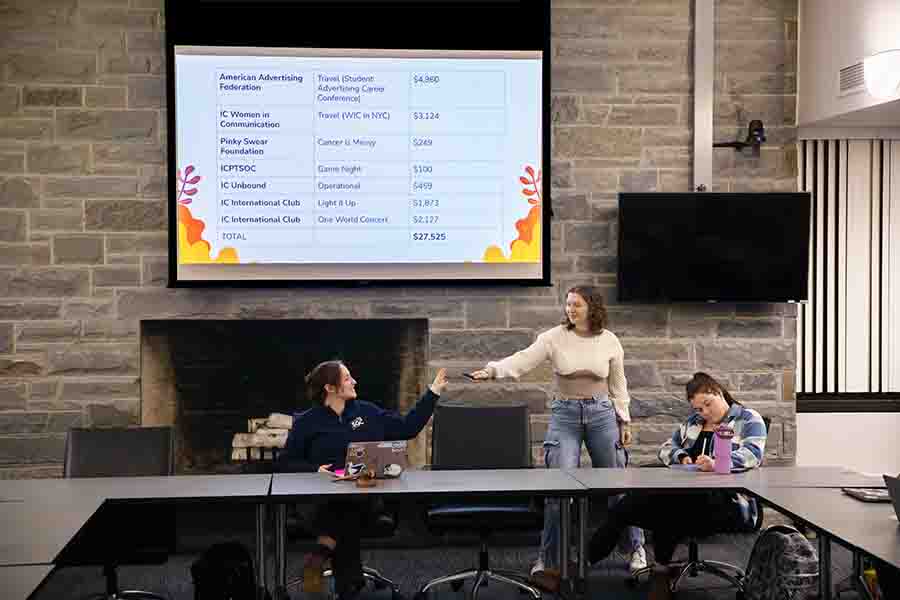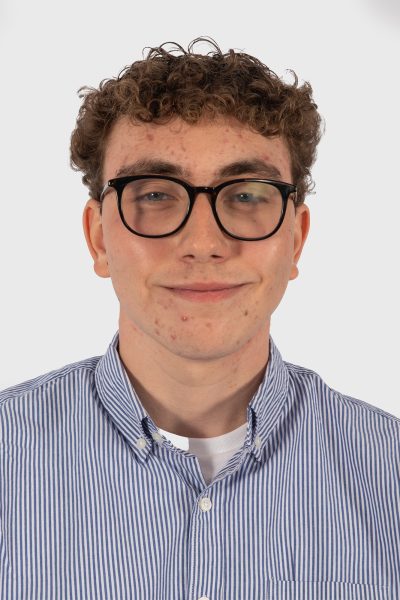The Ithaca College Student Governance Council met Oct. 14 to hear from members of the Academic Calendar Committee about adding two days of classes to the 2026–27 academic year calendar.
The council also heard from senior Noah Richardson, student liaison to the Alumni Association Board of Directors, about ways to connect students with alumni, and from junior student trustee Mureen Doherty about her role on the college’s Board of Trustees.
2026–27 Academic Year Calendar
Sophomore senator-at-large Joslyn Forcione and junior international senator Baneet Pukhrambam are part of the college’s Academic Calendar Committee, which includes faculty, staff and the two members of SGC — reports proposed calendars for upcoming academic years to Melanie Stein, the provost and senior vice president of Academic Affairs.
Every semester must have 15 full weeks of classes, but the 2026–27 academic year calendar only has 14 Thursdays and Fridays in Fall 2026. Pukhrambam said the committee needs to add two more days to the semester and remove two days students would usually get off.
“It’s just because that’s how the days lined up,” Pukhrambam said. “It happens sometimes, so we need to find a way to get [Thursday and Friday] to 15.”
Pukhrambam proposed shortening Thanksgiving break — typically nine days long, beginning the Saturday before Thanksgiving and ending the Sunday after Thanksgiving — by holding classes the Monday and Tuesday before Thanksgiving, which could mean Thanksgiving break would start the day before Thanksgiving.
“The thing about shortening Thanksgiving break that you have to keep in mind … is that if you take two days off of one side, you lose one of the Saturdays and Sundays,” Pukhrambam said. “So basically, you lose four days of Thanksgiving break.”
Forcione suggested pushing back finals by two days, shortening the amount of time professors have to grade finals and could possibly lead to accessibility concerns for students who use Student Accessibility Services for testing. Pukhrambam suggested getting rid of fall break. Forcione proposed holding classes on Labor Day and getting rid of one day of fall break.
“That would give us two days,” Forcione said. “That would make sure that we still have all Thanksgiving break, just one less day for fall break, [when] I do know that a lot of students don’t travel.”
Alumni Association
Richardson said he can help students get in contact with alumni who share career interests, student organization involvement and geographic proximity.
“You could reach out to me and be like, ‘Hey, are there any alumni who have this specific experience or this specific knowledge?’” Richardson said. “And then I would reach out to the board and really highlight, ‘I have students who are interested in talking to people who have expertise and experience in this area. Who do we have that could come to the college?’”
Richardson said a large number of the alumni who come to speak to students are from the Roy H. Park School of Communications rather than other schools at the college. He said as a student in the School of Humanities and Sciences, he has not seen much communication between humanities students and humanities alumni.
“Everyone has something to teach someone else,” Richardson said. “I think that most of the alumni … would be eager, or at least would enjoy, to come back and share expertise and knowledge.”
Student Trustee
Doherty has full voting rights on the board, except on matters that directly affect her, like student code of conduct and the price of tuition.
“I can have my opinion as much as I want,” Doherty said. “However, I must abstain from those votes. While it may feel, from the student perspective, [tuition and student code of conduct are] the most important thing to talk about in these meetings, there are other things of equal importance, as well, because we are thinking of the institution as a whole, not just the student.”
Doherty said her role as a student trustee means she is obligated to keep certain information confidential, so that she does not accidentally spread misinformation about the college and the trustees. She said students should always be aware about her obligation to keep information confidential.
“Always assume that I’m coming out of good faith and that there’s information that I may know, however, I cannot share,” Doherty said. “I tend to have information that will trickle down the line, because my role is not a few months or a semester or two away. My role has impact years down the line, like [the] two trustees before me who elected President Cornish.”














